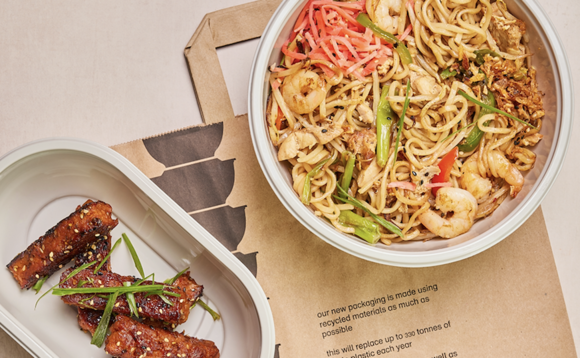
Wagamama is removing most of the plastic from the packaging used in its food deliveries and shifting instead to fully recyclable materials, in a move the restaurant chain claims could remove up to 330 tonnes of virgin plastic from its supply chain each year.
The new packaging is to be made from recyclable material known as cPET, which Wagamama claims it is among the first major restaurant chains to use as a basis for its soup and noodle bowls. It said the material could replace more than eight million of the plastic delivery bowls it uses every year.
The move could also reduce the carbon footprint of Wagamama's katsu curry - its most popular dish - by as much as 62 per cent, it said.
Wagamama said the new packaging had been four years in the making, taking in advice from leading plastic experts, UK waste collectors, suppliers and cutting-edge product designers to come up with the final design.
The cPET material, which is more commonly used for supermarket ready meals, is made from 70 per cent recycled content, and its material's heat-resistance capabilities make it the "perfect" vessel for delivering hot ramen, Wagamama said.
The remaining 30 per cent of the packaging of its delivery products will still be made using plastics, however. But Wagamma stressed that such plastics were still necessary in order to maintain the structural integrity of the containers.
It hopes the move will "help tackle the world's increasing plastic pollution problem", it said.
In addition, the firm is launching a bowl-return programme called ‘Bowl Bank' which it created in response to the varied practices of the UK waste streams. The initiative, which enables Wagamama customers to bring back their used soup and noodle bowls to be recycled or reused, is set to be available in all restaurants by October of this year.
"We are in a fortunate position that Wagamama is much-loved by consumers, but we know this comes with a huge responsibility," said Wagamama chief executive Thomas Heier. "Reducing our use of virgin plastics is a complicated mission - but one we have been dedicated to for four years. This has been driven by the belief that we needed to do better for our guests, teams and the planet."
The new packaging is set to roll out from August 15 and will be live across all Wagamama restaurants and delivery kitchens by October this year, the firm said.
The cPET containers have been made using a sand colour, chosen so that the bowls can be better detected by infrared scanners in recycling plants, along with a recyclable lid, it explained.
Simon Ellin, president of the UK Recycling Association, helped advice Wagamama on the move to cPET, and described the move as "incredibly encouraging".
"There's so much misinformation and false claims about where rubbish goes, you really need to take the time to fully understand the problem," he said. "Assessing their business needs, I'm confident cPET is the most sustainable option available to them at this time, and I'm pleased to see they have invested in this option. They will be leading consumer behaviour change with their ‘Bowl Bank' initiative, and it would be brilliant to see more return initiatives like this from their peers."
In addition, Wagamama said it is experiencing "huge" demand for its range of plant-based dishes, which it said now comprise more than half of its menu.







